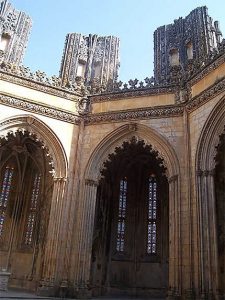 Using the Past: The Middle Ages in the Spotlight
Using the Past: The Middle Ages in the Spotlight
The international conference “Using the Past: The Middle Ages in the Spotlight” will take place at the Monastery of Santa Maria da Vitória (Batalha, Portugal) on December 10–12, 2020.
The conference aims at bringing together scholars from all around the world concerned with the uses of the medieval past. Participants will address when, where, how, why and by whom the medieval past has been used, with papers embracing a broad chronological timeline that begins in the medieval period itself and extends to include contemporary politics, society and mass media. Thus, this conference seeks to provide a forum for scholars who are willing to examine and to advance knowledge on the use of the medieval past, contributing to a better assessment of contemporary realities, problems and challenges.
Possible questions, topics and approaches may include, but are by no means restricted to, the following:
- Methodological Approaches: Terminology, Concepts, Categories. Scholars are invited to present papers focusing on the terminology and conceptual frameworks of Medieval Studies, Medievalism and Mittelalter-Rezeption. Papers questioning the uses, accuracy and usefulness of traditional categories within Medieval Studies, such as Gothic, Romanesque, Anglo-Saxon, or Dark Ages, would also be appropriate.
- Academic Medievalism. Scholars are invited to analyse how and to what extent personal ideologies (e.g. political or religious) underpin academics’ approaches to the Middle Ages, whether implicitly or explicitly. In addition, papers in this category might consider how the locations of universities and research centres within specific geopolitical contexts might influence academics to promote a certain vision and study of the medieval period (e.g. institutions located in a region or territory with separatist or nationalistic agendas).
- The Reception of the Middle Ages. Scholars are invited to propose case studies addressing the use, reuse, recreation, invention, imagination and evocation of the medieval past, from the Middle Ages onwards, both in European and Non-European territories. Papers considering the medieval past as inspiration in literature, visual arts, music, theatre, cinema, television, comics or video games are welcome. In addition, papers focusing on longue durée phenomena will be very appropriate (e.g. the political and ideological (re)use of medieval figures during and after the Middle Ages, or the creation of collective memory and its use in families, institutions, societies and nations). Regarding non-European territories, we welcome case studies that focus on (but are not limited to) the following questions: What kind of agents were involved in promoting, creating and receiving medieval heritage in the nineteenth through twenty-first centuries in non-European territories? What was the relation established with native cultures? Was there any attempt to combine medieval European recreations with local cultural and artistic traditions?
- Contemporary Politics, Society and Mass Media. The conference aims at analysing the noticeable and repeated number of recent phenomena—from the Iberian Peninsula, to Brazil and New Zealand—where the medieval period has been invoked in political campaigns, in support of independence movements, and as justification for racialized agendas and even terrorist attacks.
- Tourism and the Middle Ages. Special attention will be given to case studies that approach how the growing development of tourism from the nineteenth century onwards determined a certain vision of the Middle Ages, or, conversely, how grotesque/romantic views of the Middle Ages have been used to promote tourism. Papers considering how current tourism determines the conservation and restoration of medieval and neo-medieval heritage (e.g. the case of the Notre-Dame cathedral in Paris) are also welcome.
We invite participation from graduate students, early career researchers and senior scholars. Participants are welcome to present in English, Portuguese, Spanish, French or Italian. Proposals for either 3-paper sessions or individual papers are equally welcome. Individual papers should be 20 minutes in length.
Please submit an abstract and a brief CV of no more than 300 words each to medievallyspeaking@gmail.com by March 31, 2020.
Plus d’informations sur le site du colloque : http://using-the-past.mozello.com/

Leave a Reply
You must be logged in to post a comment.